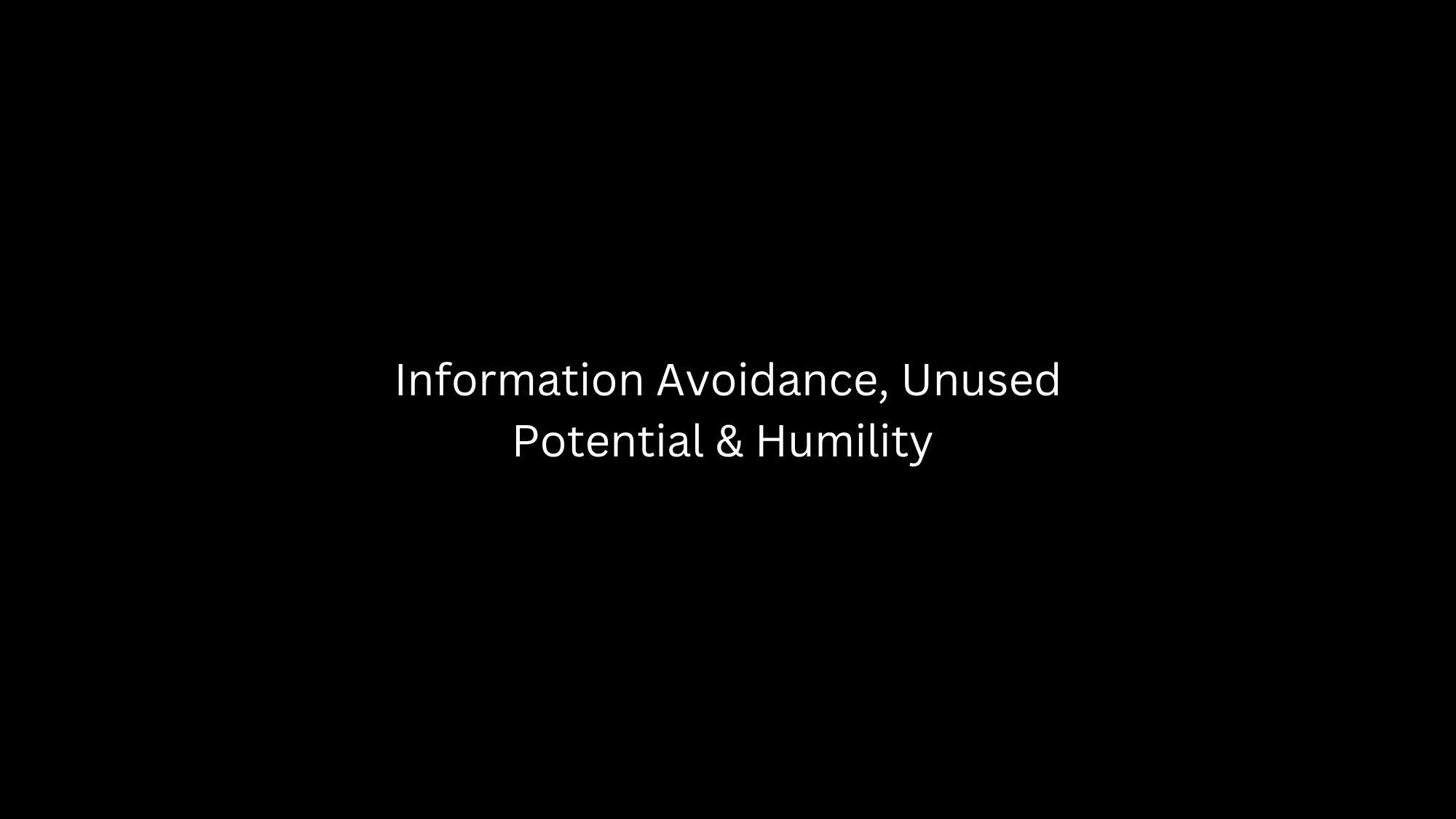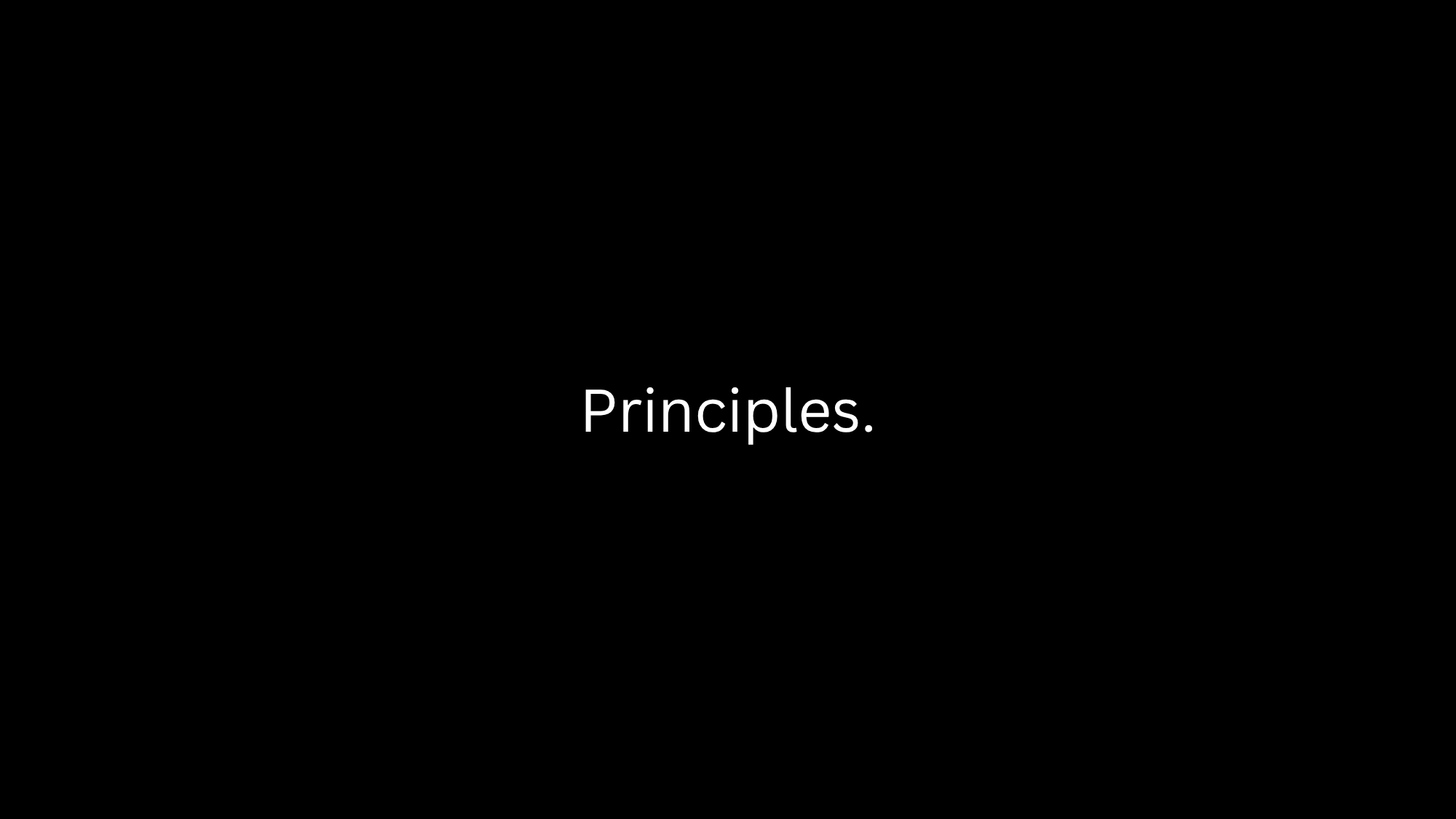

11 Life Lessons I Would’ve Paid £11,000 to Know at 18
1.) Things are always scarier before they occur
Fear is oftentimes underwhelming.
You build something up in your mind before you do it imagining you'll be lucky to come out the other side of it with your head still intact.
Perhaps you stall on approaching an attractive stranger due fear of being rejected, delay making the decision to quit your job for fear of what your boss would say, or postpone having a difficult conversation with your partner in fear they won’t take your genuine desires seriously.
But when you get fed up with your inaction and decide to take the plunge into the abyss of fear, you realise it’s only an inch deep. And that thing, that terrible thing you imagined might happen in your mind; that the stranger might shout at the top of their lungs and bring every passerby’s attention to your reprehensibility or that your boss might tangle you in chains and demand you don’t leave, or that your partner will gasp a shock of disgust and run for the hills, doesn’t happen.
And you're free to realise, things are always scarier before they occur.
- Starting my youtube channel became a normal hobby after 3 videos
- Travelling around Europe alone became exciting rather than nerve-wracking as soon as I arrived at my first destination
- Giving an attractive woman in Mallorca my number became just a normal conversation 10 seconds in
So in the words of Alan Watts, when you see a ghost, walk straight through it. Otherwise it will morph itself from a mouse to a dragon within your imagination.
2.) There are no solutions, only trade-offs.
Us humans are full of tricks. Most of which we play on ourselves.
We convince ourselves one day, if we work hard enough, we can rid ourselves of all our problems.
But the truth is, life can never, by design, be rid of problems. So the key is to improve the quality of our problems.
This also highlights something interesting about decision making. When at a crossroads we might stall believing there’s a perfect option yet to be found. One that will rid us of our decision fatigue.
But the reality is, perfect options don’t exist. To make the right choice we must understand each decision comes with downsides. So the key is to pick the decision with the most tolerable downsides.
For example:
- If we imagine moving country, the tradeoff will be; our environment will improve and the weather may well be better but we’ll have to put up with not speaking the local language as fluently as we do our own.
- Or if we decide to quit our job to temporarily move back into our family home to work on building a sustainable career, the trade off will be: we’ll save money on rent but will have to put up with family members who always stick their noses in our business.
So pick your downsides carefully.
3.) Not grasping, absent-mindedly. But letting go, smilingly.
The main problem we cause for ourselves throughout life, and in our relationships, is by making things more serious than they need to be. And such an approach causes us to grip tightly to life and those we hold dear.
For example:
- We might become lazily attached to friends, not because of any shared interests between us or valuable conversations, but because we’ve known them for the last 10 years.
- Or perhaps our insecurities cause us to control our partner for fear if we let them go, and be who they actually are, they might realise they’re better off without us.
But letting go of any grip you have on anything in your life is what allows you to do better and paradoxically become more attractive, joyful and respectful of others.
Because many people will come in and out of your life. Some people might stick around for longer whereas some might appear as a mere flash of light before disappearing into the abyss, leaving us questioning “was that the right person wrong time?”.
But allowing people to come and go involves embracing a fundamental reality of life; change.
As we change, so do others.
So the thing to realise here is; if you never grasp on, you’ll never have to let go. In other words, people aren’t yours to own. Everyone has their own destiny, wants and inner-selves to actualise, including you. And no amount of manipulation, forcing or bargaining will improve our relationships with others or convince them to stay in our lives if they were never meant to in the first place.
Choose to be with those who stayed by choice, and not because you chased them every time they threatened to leave.
When there is no pressure to be a certain way and when we’re given the space and time to be our authentic selves, relationships flourish. And we quickly learn who wants to stick around and who doesn’t. Meaning; we will lose people, due to change, incompatibility or things just naturally “fizzling out”.
And with loss comes grief.
But this principle, not grasping, absent-mindedly, but letting go, smilingly, also allows you to approach grief not as a dark aspect of life but as a source of light.
Because in the words of the Persian poet Rumi:
“Don't grieve. Anything you lose comes round in another form.”
Let people go. And your relationships will improve.
4.) Don’t cut what can be untied
A good friend of mine gave me an unforgettable piece of advice after I had broken up with a girl I was dating only to realise I had more things to say to her.
He told me: “don’t leave things on definite terms when you’re still emotional about it.”
What this means is, be careful of post-event realisations.
If you’re ending a relationship, or nearing the end of it, understand that your emotions will want you to make a decision, much to your intellect’s demise.
Essentially this is a difference in slow vs fast thinking.
To rid ourselves of the emotional turmoil we feel, we’re apt to make a quick decision, such as ending the relationship as quickly as possible, only to realise a few days or weeks later there's a lot of things we left unsaid.
Then you may feel the need to reach out to that person, who’s currently grieving, to get whatever it is off your chest.
So to avoid this, if you can, make sure you close a relationship with an open and honest conversation, allowing yourself to be sincere and vulnerable. Rather than blundering it with your axe of decisive action.
5.) The closer you are to the truth, the more silent you become inside.
I think the main difference between ego and confidence is noise.
Ego is loud, confidence is calm.
And this highlights a peculiar nature of us human beings. When unsure of something, we aim to convince others we are sure lest they discover we’re not.
We might try to convince others:
- Despite our darkest desires, we’re actually very generous.
- Regardless of how much we know, deep down, that this person isn’t right for us, we’ll highlight all their great qualities to others as to convince them this person is right for us.
In a way, it’s only through a lack of self-belief that we rely on the approval of others, which disturbs our silence within.
Because true self-assurance doesn’t need approval. To be self-assured is, by definition, to be certain and in no need of external validation.
And the route to such self-assurance is through self-reflection and solitude.
The more we probe the darkest parts of ourselves the less they torment us. And the less they torment us, the more we become not a stranger to ourselves but well known friends. And the more silent our soul becomes.
The more we’re comfortable in our own skin and company, the more we realise there isn’t anyone to perform for. Nor are there any “comments” from others to worry about.
As Naval Ravikant says:
“Just like a low resting heart rate is the byproduct of intense exercise, low anxiety is the byproduct of intense self-examination.”
6.) The master has failed more times than the beginner has even tried
The other day I was reflecting on the invaluable lessons I’ve learned from learning Spanish.
I’ve been learning the language for the last 3 years and it’s taught me:
- In a humble state you learn better
- Just get slightly better every single day
- Learning is not a linear process (somedays you sound like a caveman, other times you sound like a native opera singer)
But most importantly, learning Spanish has taught me; the main difference which separates people’s abilities, in anything, is the amount of times they’re failed.
Native speakers speak the language better than you because they’ve spent 25 years failing at that language.
A Jiu Jitsu black belt can tap you out with ease because they’ve spent 10 years failing, and failing and failing.
When we look at people more successful than us, we assume it’s because of some innate talent. Rather than sheer tenacity and a growth mindset.
But, as the saying goes, if you hear hooves outside, assume it’s a horse, not a zebra.
So when you see someone who’s better than you at something, assume they are so because of hard work and a good relationship with failure. Not because of sheer luck or talent.
7.) It doesn’t matter where I am in the world, what matters is where I am with myself
Oftentimes throughout life, you’ll convince yourself you need to “get away from it all”.
Perhaps you envision escaping your current life by jetting off to South America, South East Asia or someplace where life doesn’t feel like such a drag.
But one thing I’ve realised is, in such scenarios, you rarely, if ever, get the respite you hope for.
Because:
1.) You bring ruins to ruins. (Yes you may feel uplifted by pastures new, but soon you’ll realise the cause of your suffering, after all, was you. And you’ve merely brought yourself to a new place with the same mindset.)
2.) When you return, you’ll be even more dissatisfied because the real issue/s hasn’t been addressed.
I couldn’t imagine any life worse than working Monday to Friday and spending each weekend relieving myself of the midweek drudgery.
Hence, I believe if you’re ever in a state where you’re taking more breaks than usual, fantasising about moving away, or taking frequent holiday trips to escape your day to day life, you should put all of your focus into building a life you’re not trying to escape from.
It will take longer to do, but will prove more valuable than doing anything else.
Imagine if you took all the energy, time and money you spend on going on holiday each year, or going on excursions each weekend and poured it into building a life you didn’t need to escape from.
It might take 3 years to do so, but it will be the difference between putting up with a life you want to change for 3 years rather than living a quiet life of desperation for 60 years.
So, be wary of seeking external environments to fix an internal problem. Cultivate the relationship you have with yourself and build a life you want to live rather than flitting from one get away to another.
8.) You’re not lost, you’re just early in the process
Late 2023 I felt lost.
I was working full time on my YouTube channel, experiencing some positive feedback to my videos, but overall feeling a lack of belief as to if anything would work out.
I knew what type of lifestyle I wanted to live, but 6 months in to me doing YouTube I didn’t have a clear idea of how it would workout.
Until one day, the saying “you’re not lost you’re just early in the process” came to mind. And I felt relieved.
Suddenly I realised; if I just keep doing what I’m doing, soon enough, perhaps in a year, I’ll be closer to where I want to go.
6 months later I grew to 50k subscribers.
So the point here is to realise; when you start something new, you will experience disorientation in the beginning. That’s the cost of entry. But for the long-run, you should keep an ever watchful eye over your trajectory.
Because if you get clear on what daily habits contribute to the most progress, and you continue to follow them, in some time, with no guarantee when, those days will prove invaluable.
Just because you’re not seeing any results doesn’t mean nothing is happening.
Because nothing happens, then everything happens.
Keep going.
9.) Continuous improvement = better than delayed perfection
Related to the last one, I’ve learned to do away with perfectionism.
Because it gets you nowhere but inner tension and delayed living.
What’s better, as mentioned before, is to meet yourself where you are in terms of what action, no matter how small, you could do right now which will steer you in favour of:
- Building the life you want to live
- Giving yourself fully to the world, in an as valuable way as possible
Also, I’ve realised the times I’ve felt the most depressed have stemmed from a lack of progress in the areas I deemed most important.
And the most meaningfully engaged moments I’ve experienced in life have come from the positive restoration I feel that; I’m on the right path, I’m getting better, I’m making progress.
Those areas are:
- I’m getting wiser
- I’m getting stronger
- I’m getting healthier
- Overall; I'm just getting better
10.) I think Simple is the enemy, when really it’s the answer.
A lot of life is boring.
We imagine change involves making monumental decisions and enacting grand plans which revolutionise our very psychology. When really a lot of "life change" involves simple, everyday things:
- Consistently going to bed early will do more for your mental wellbeing than spending all your money to travel the world.
- Deciding to limit your daily to-do list to a maximum of 3 things will steer you closer towards sanity than subscribing to a £500 a month productivity programme ever could.
- Practicing the habit of smiling while asking for someone else’s name when you meet them is much better for your social flourishing than any advanced seduction tactic.
I think this is essentially what maturity is; realising that it’s the small, daily and sometimes very boring things we do which make up our lives and ultimately help us enact the change we want to see.
And the quality of our lives, mental health and self-esteem improves when we continue to prioritise these small things. Even when the world wants us to live a Hollywood-esque lifestyle.
11.) Sunshine all the time makes a desert
Finally, and much to our annoyance, all those times our conversations have concluded with the cliche “it’s all about balance” have been some of our most underrated philosophical realisations.
Because life operates with an inherent duality. A duality we’d do well to remember in those times when we wish everything were just sunny and rosy all of the time.
We’re all running on a hedonic treadmill, meaning whatever new, shiny and glamorous joy we experience in our life, if exposed to enough times, will eventually become normal.
- Living in that new sunny destination soon becomes our normal, everyday life after just a few months.
- That new car we’ve just bought quickly fades from being a new source of joy in our lives to a mere means of getting from A to B.
- That stranger we imagine jetting off into the sunset with gradually becomes, much to our chagrin, a normal, simple human being after all.
So the key thing to understand here is that for every ounce of joy we experience, there is an equal ounce of sadness. For each jolt of pleasure we experience there is an equal and opposite pang of pain.
So don’t turn to clothes, cars, people, money or substances to fulfil your yearning for contentment, peace, joy or serenity.
Look inside for the stability you crave.
And then operate in the world from that place, connecting with everything but attaching to nothing.
Thanks for reading.
Lew x
tHURSDAY'S THERAPY
Join 8934+ improving their mental health & social skills 1 Thursday newsletter at a time
Thank you for subscribing to the big 3 newsletter!
Happy to have you here!
Happy to have you here!
Oops! Something went wrong while submitting the form :(
try refreshing the page and trying again!
try refreshing the page and trying again!



.png)
.png)
.png)

.png)

.png)



.png)

.png)


%20(1).png)